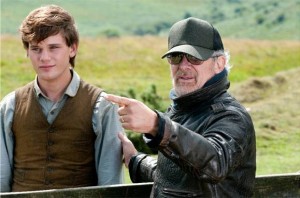
War Horse was directed by Steven Spielberg and the reviews are AWESOME! This movie comes out on Christmas Day! Be ready to take your family to this movie! I can’t wait to see it!!!! When it comes to movies, Spielberg is the biggest and MOST amazing director that exists–my opinion–no, fact!!!
Remember that going to the movies can be done frugally! I am always posting about cheap movie deals, movies clubs, coupons and MORE!
1) Q: It’s interesting how you came to discover “War Horse” because there is both the book and the play. Can you talk about your experience discovering the material?
A: It was discovered for me by Kathy Kennedy, who had already experienced it in the West End in London and told me about it and how moved she was by the play. Then Stacey [Snider], the head of my company, DreamWorks, flew over and saw it without me. And she concurred with Kathy about how powerful a story it was. The puppets are magnificent on stage; the puppeteers are in a way the stars of the show. But we knew that if we were going to tell the story, it was going be with real horses, not with maquettes or marionettes. So then we preemptively made a bid to buy it even before I saw it, just based on the story, which really appealed to me.
I also read the Michael Morpurgo book right after Kathy and Stacey had seen the show on the West End. I love the book. But the book is told from Joey’s point of view. You even hear Joey’s thoughts. I knew that was not an avenue into adaptation to film but it really made me understand the story from several different viewpoints. So then my wife and I flew to London and we got a chance to see “War Horse” for the first time. And that sealed the deal as far as I was concerned.
2) Q: What themes in the “War Horse” story stood out to you?
A: “War Horse” says a lot about courage; the courage of this boy and what he endures and what he overcomes to achieve what he needs and not just for himself but also for his best friend, his horse Joey. It’s also about the courage and the tenacity of this extraordinary animal. The theme of courage kept coming back and back from the play, from Michael Morpurgo’s book and from Lee Hall and Richard Curtis’ screenplay. That was the underlying subliminal theme that I think informs every frame of “War Horse.”
3) Q: How did you go about adapting the story to the screen?
A: The first thing I pulled from the book—and certainly was inspired by when I saw the play—was this idea that a family that is under the boot heel of a very strict and unforgiving landlord needs to buy time to succeed with their farm. The father, in a drunken state, buys a horse to pull the plow to save the farm. And the warmblood he buys, who we call Joey, is in no shape to pull a plow, as that breed is not suited for that work. It’s not the kind of horse that does manual labor, so to speak.
Yet through a tenacious belief in one another, the young son, Albert, and Joey formed this bond. And together they were able to at least attempt to save the farm by plowing in a stony, infertile field. It just creates such a synergy and just a real empathic collaboration between horse and boy that when they are separated because of World War I and the horse is sent off to serve in the war as a beast of burden, the audience really knows that at some point there is going to be a date with destiny. And when that date with destiny between the boy and the horse occurs, that is a little bit of the mojo of the movie.
4) Q: How did you approach casting the part of Albert?
A: For the part of Albert, I was looking for a complete unknown. I didn’t want the person playing Albert to bring a portfolio of distinguished parts from other films. I really wanted a face. Joey, the horse, was a fresh face, so I wanted a little parity there. Let the horse be an unknown. Let the boy be an unknown. So we basically didn’t even consider anybody that was known to television audiences or moviegoers and mainly started searching for the right character for the right part.